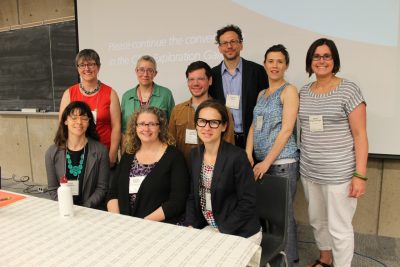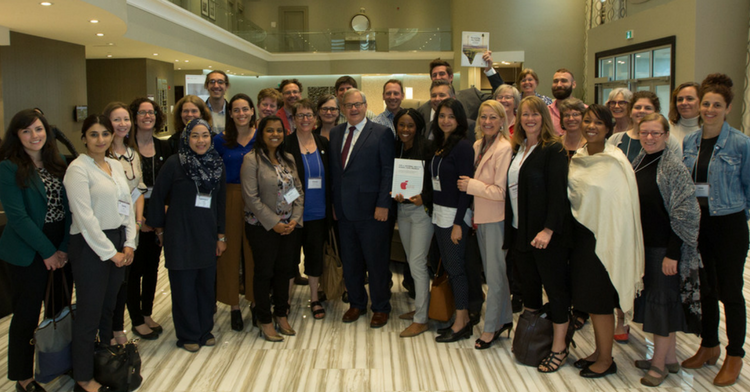Story and podcast by Nicole Bedford, CFICE Project Manager and Communications Coordinator
Sometimes it’s hard to trace the direct impact that government programs have on our communities. This is partly because on-the-ground projects leading to community change often receive funding from many sources, including private donors, industry partners, foundations, and various levels of government. In the end, the question remains: Who gets the (most) credit for project outcomes and impacts?
Listen to the podcast below, or continue scrolling to read the full story! Download a PDF of the podcast transcript.
In Food Secure Canada’s (FSC) case, a partnership through the government-funded Mitacs Accelerate program has had a direct impact on their ability to contribute to consultations on building a Food Policy for Canada. With the Government of Canada’s extremely short Food Policy for Canada consultation window—May 29 to September 30, 2017 to be exact—having a Mitacs Postdoctoral Fellow provided FSC with additional policy and research expertise at just the right time.
“Being able to hire Amanda Wilson through Mitacs has given FSC the capacity to increase the number of voices being heard in the Government of Canada’s consultation process,” says Diana Bronson, Executive Director of FSC. “Amanda’s efforts, our partnerships with entities like CAFS and CFICE, along with the work of the FSC team as a whole, have lead to a much more robust engagement process around national food policy.”
According to the Mitacs website, the goal of the Accelerate program is to put “talent to work with an organization that needs it.” They do this by matching community or industry partner funding for research projects that include a postdoctoral student, a supervising professor and a partner organization. The project submitted by FSC, in collaboration with Amanda and supervising Lakehead University professor Charles Levkoe, was titled Within Our Reach: Building Community Academic Partnerships in support of a National Food Policy.
“Our goal with this project was to increase the capacity of community and academic partners to contribute to a national food policy process,” explains Amanda. “We wanted to experiment with different ways of collaborating and sharing resources for policy impact, all with the goal of pushing for more just, healthy and sustainable food policy.”
Through the project, Amanda has been able to take the lead on developing policy briefs (notably FSC’s Discussion Paper on National Food Policy and their Final Recommendations on A Food Policy for Canada) and engaging with FSC members and academic partners to generate and refine policy recommendations. This included outreach to academic allies of FSC, as well as targeted engagement around New Farmers and Northern Food.
FSC has a long history of community-academic collaboration. A partner in CFICE since the beginning of Phase I, FSC creates space and opportunities for academics, non-profits, and community organizations to work together on research and advocacy for a just and sustainable food system.
“From day one, working with Food Secure Canada has been a bit of a whirlwind,” recalls Amanda. I’ve been involved in so many different events and processes. But it’s been a great opportunity to build relationships with community organizations and academics across Canada and to hopefully have a real impact on the government’s policy-building process.”
While the results of FSC’s advocacy efforts are not yet fully available—the first draft of A Food Policy for Canada won’t be out until mid-2018—the impact of having matching funds for Amanda’s position are clear.
“We wouldn’t have been able to generate the same depth and breadth of policy analysis, or connect with our members to the same degree without Amanda’s help,” says Diana. “The Mitacs funding has really increased our ability to meet our core goal of supporting the food movement to engage in meaningful policy change. The best part is that the funding lasts for two years, which allows us to breathe and really maximize Amanda’s contributions to our organization.”
As for Amanda, she’s happy she’s had the opportunity to work on such a high-profile policy process that incorporates so many of the crucial issues facing our food system. “Working in a community context, there’s a tangible impact of the work I’m doing that you don’t get in a strictly academic context, which is something I really appreciate.”
With another year of funding left for Amanda’s postdoctoral position, this collaboration is sure to continue generating important policy insight that contributes to a stronger food movement in Canada.
Become more community-first!
To learn more about how to make your work more community-first, check out our list of actions for all community-campus engagement practitioners!


